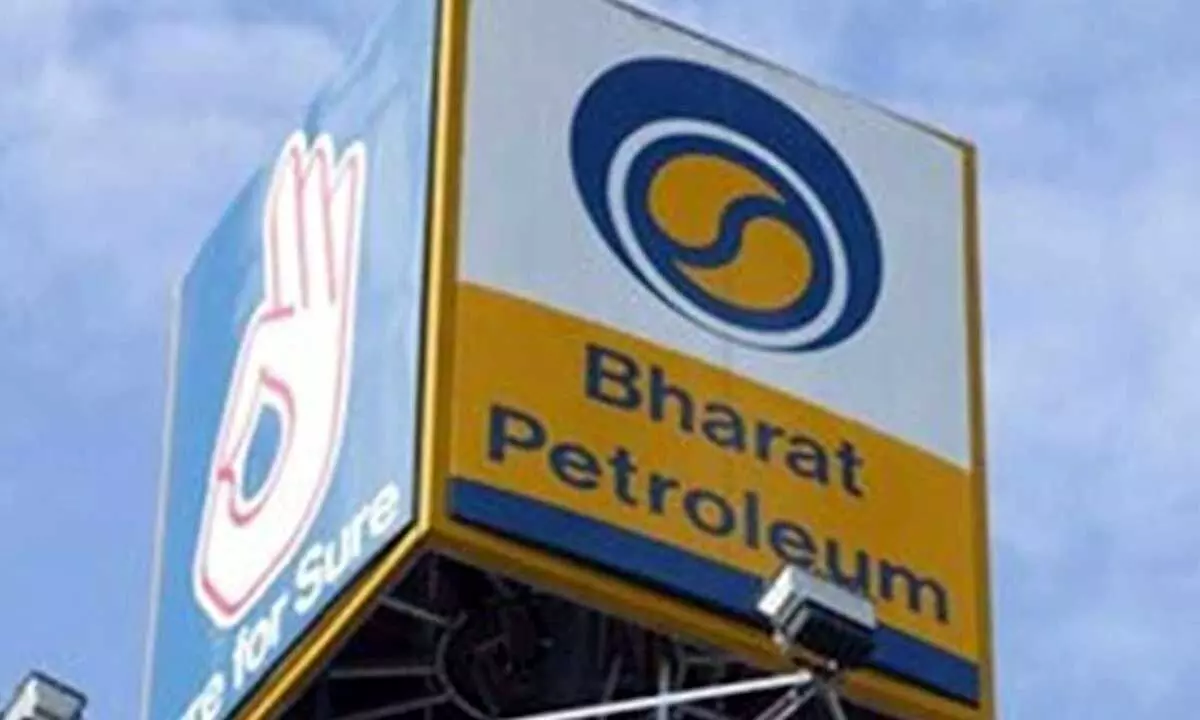BPCL net profit jumps to Rs 10,644 crore in April-June
The earning in the first quarter was 55% higher than the net profit of Rs 6,870.47 crore in the preceding January-March quarter
image for illustrative purpose

New Delhi: State-controlled Bharat Petroleum Corporation Ltd (BPCL) on Wednesday reported a net profit of Rs 10,644 crore in the June quarter as a freeze on the retail selling price of petrol and diesel despite a fall in oil prices helped turn around fuel marketing margins.
The consolidated net profit of Rs 10,644.30 crore in April-June (first quarter of current 2023-24 fiscal year) compared to a net loss of Rs 6,147.94 crore in the same period last year, according to a company's filing with the stock exchanges. The earning in the first quarter was 55 per cent higher than the net profit of Rs 6,870.47 crore in the preceding January-March quarter.
In early April last year, BPCL and other government-owned fuel retailers - Indian Oil Corporation (IOC) and Hindustan Petroleum Corporation Ltd (HPCL) - froze retail petrol and diesel prices to cushion domestic consumers from rising international oil prices. That freeze led to the three retailers suffering heavy losses in not just April-June 2022 but also in the subsequent quarter. Margins on petrol and diesel turned positive following softening of international oil prices in the June quarter, but rates were not revised, and the companies recouped losses they incurred last year. The fall in oil prices meant that revenue from operations for BPCL dipped seven per cent to Rs 1.28 lakh crore.
The company earned $12.64 on turning every barrel of crude oil into fuel during the quarter ended June 30 against a gross refining margin (GRM) of $27.51 per barrel in the same period last year, the filing said. BPCL also accounted for a Rs 24.51 crore foreign exchange gain against a forex loss of Rs 962.53 crore in April-June 2022. Its EBITDA rose 41.8 per cent quarter-on-quarter to Rs 15,809.7 crore in April-June.
The profit BPCL reported in April-June is multiple times higher than the total net profit of Rs 2,892.34 crore in the full 2022-23. IOC, BPCL and HPCL temporarily abandoned the daily price revision last year and have not revised petrol and diesel prices in line with the cost. And the losses they incurred when the oil prices were higher than the retail selling prices are recouped with rates dropped.
Officials said the three firms have been making positive margins on petrol since the fourth quarter of the 2022 calendar year but diesel, which accounts for the bulk of the fuel sales, had been in red. But in May, margins on diesel turned positive with a small 50 paise a litre profit, they said.
International oil prices had spiked to $139 per barrel in March 2022 in the aftermath of the Russia-Ukraine war. They cooled to $75 during May-June.At peak, oil firms lost Rs 17.4 per litre on petrol and Rs 27.7 a litre on diesel. In the October-December quarter, oil firms earned Rs 10 a litre margin on petrol but lost Rs 6.5 on diesel. In the following quarter, the margins on petrol moderated to Rs 6.8 a litre while diesel earned Rs 0.5 per litre.
Officials said oil prices have firmed up this month, and the basket of crude oil that India buys has averaged $79.37 per barrel so far, making a reduction in rates difficult. Holding prices when input cost was higher than retail selling prices led to the three firms posting net earnings loss. They posted a combined net loss of Rs 21,201.18 crore during April-September despite accounting for Rs 22,000 crore announced but not paid LPG subsidy.
International oil prices have been turbulent in the last couple of years. It dipped into the negative zone at the start of the pandemic in 2020 and swung wildly in 2022 - climbing to a 14-year high of nearly $140 per barrel in March 2022 after Russia invaded Ukraine before sliding on weaker demand from top importer China and worries of an economic contraction. But, for a nation that is 85 per cent dependent on imports, the spike meant adding to already firming inflation and derailing the economic recovery from the pandemic.
So, the three fuel retailers, who control roughly 90 per cent of the market, froze petrol and diesel prices for the longest duration in at least two decades. They stopped daily price revision in early November 2021 when rates across the country hit an all-time high, prompting the government to roll back a part of the excise duty hike it had effected during the pandemic to take advantage of low oil prices.
The freeze continued into 2022 but the war-led spike in international oil prices prompted a Rs 10 a litre hike in petrol and diesel prices from mid-March before another round of excise duty cut rolled back all of the Rs 13 a litre and Rs 16 per litre increase in taxes on petrol and diesel effected during the pandemic. That followed the current price freeze that began on April 6, which still continues.

